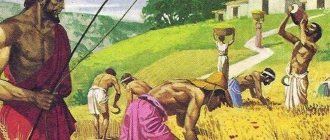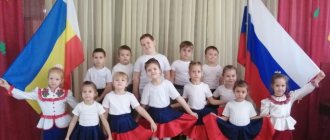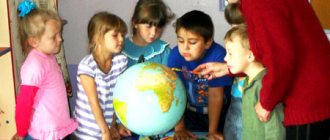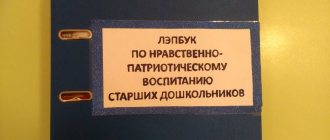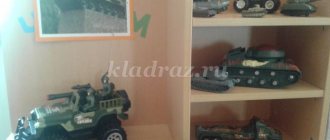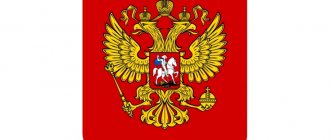Summary of educational activities on patriotic education in the preparatory group
Summary of educational activities on patriotic education in the preparatory group “Our Motherland - Russia”
Author: Voroshilova Anna Samuilovna, teacher of the MADOU TsRR d/s No. 121, Kaliningrad
Description of the material: I offer you a synopsis of the GCD on patriotic education for children of senior preschool age. This material will be useful to teachers working with children 5-6. Goal: Systematization of knowledge on the topic. Objectives: • To consolidate children's knowledge about the state symbols of Russia; • Foster a feeling of love for your Motherland – Russia; • Expand ideas about the nature of Russia; • Develop the ability to correctly construct your answer, according to grammatical rules; • Develop cognitive interests; • Foster in children a sense of camaraderie, the ability to empathize and support each other; • Create a joyful and cheerful mood in children. Preliminary work : examining maps; looking at illustrations on the topic. Vocabulary work: Russia, coat of arms, anthem, mace, scepter. Material: Maps, coats of arms, flags, mosaic. Music sounds: “Hymn” by A. Alexandrov Progress of NOD: Educator: We live in a country that has an amazingly beautiful name - Russia. Do you know why our country has such a name? (children's answers) For clear dawns, washed with dew, For a Russian field with tall ears of corn. For the rivers flowing in the blue flame You were called Russia in Slavic. There are many wonderful countries on Earth, people live everywhere, but Russia is the only, extraordinary country, because it is our Motherland. What do you think the Motherland is? Homeland means dear, like mother and father. Homeland is the place where we were born, the country in which we live. (Every person has one homeland.) Let's test our knowledge about Russia. I will say the beginning of the sentence, and you will finish it. - Our country is called... Russia. — Citizens of Russia are called... Russians. - Moscow is the capital of Russia. - Who is the president in Russia... Putin. — Who chose the president... the Russian people. — What document does a Russian citizen have... a passport. — Which document contains the rights of a citizen of Russia... the Constitution of the Russian Federation. — What should a citizen of Russia do when living in the Russian state... observe rights and obligations. "State symbols". — What state symbols do you know? (Coat of arms, flag, anthem.) - What is the national anthem? (The main song of the country, performed on especially solemn occasions, you need to listen to it while standing, showing respect.) “Anthem” by A. Alexandrov is played. I propose to choose the Russian flag from among different flags on the board. Game "Recognize our flag." Goal: to consolidate children’s knowledge about the national flag, to teach them to recognize the Russian flag among the flags of other countries. Educator: - Where can you see the Russian flag? (On government buildings, ships, airplanes, residential buildings on public holidays.) White color means purity, blue - sky and loyalty, red - fire and courage. Find the Russian coat of arms among other countries. Game "Find out our coat of arms." Goal: to consolidate children’s knowledge about the state emblem, to teach them to recognize the coat of arms of Russia among the coats of arms of other countries. — What is depicted on our coat of arms? (Golden double-headed eagle with a scepter and orb, on the shield is depicted St. George the Victorious on a horse, he kills a snake with a spear.) Our coat of arms symbolizes the victory of good over evil, beauty and justice). "Cities of Russia". - Russia is the biggest country in the world! There are over a thousand cities and a lot of villages in Russia. Name the cities that you know. (Children name) (Showing an image of the Moscow Kremlin, looking at it, talking) “Peoples of Russia.” Educator: - What kind of peoples are there in our great country: Like a colorful sunny bouquet, Kalmyks and Chuvashs, Tatars, Komi and Mordovians, Bashkirs and Buryats - We will say kind words to everyone, We will be glad to see anyone. — How many peoples do you think live in Russia? (Children name nationalities). — How do peoples differ from each other? (They may differ in appearance.) The peoples of Russia have different customs, their own history, their own holidays, their own special national costumes. Even everyone's favorite food is different. Each people speaks their own language. The most numerous people in Russia are the Russian people, therefore the Russian language is the main one in our country: it is the language used by different peoples to communicate with each other. "The main holidays of Russia." • Motivational incentive Educator: - In our country there are main holidays that are celebrated by all citizens of Russia. Solve riddles to find out what these holidays are called. 1. Santa Claus brought gifts and puts them under the Christmas tree. The cheerful, bright, best holiday has come... (New Year). 2. So that peace may come for humanity throughout the entire large Earth, We celebrate in February the Day... (Defender of the Fatherland). 3. If we need to go somewhere, a map will help us find the way. If we need rewards, Let's start the fast run from the start... And in the spring we are happy to celebrate Women's Day... (March Eighth). 4. Music, flags, balloons and flowers, So much spring beauty around! On the first of May we will always celebrate the Joyful Holiday... (Spring and Labor). 5. There is a parade, fireworks are thundering, the orchestra is playing here and there, Not only great-grandfathers and grandfathers are celebrating the glorious... (Victory Day) 6. On June 12 we celebrate the Birthday of Russia. I end the quiz with the proverb “A Russian man cannot live without his homeland.” The homeland is what unites all people living in one country.
We recommend watching:
Summary of educational activities on patriotic education in the middle group Project in the middle group “Through the pages of Bazhov’s fairy tales” Patriotic education of preschool children through didactic games From the experience of a preschool teacher
Similar articles:
Conversation about generosity and greed with children of the senior preparatory group
Coat of arms of Russia. Description and meaning for children
